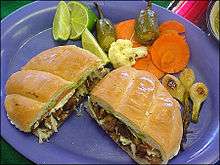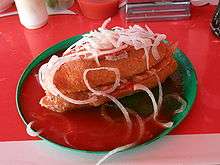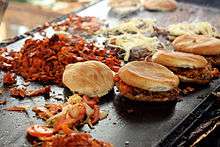Torta
|
Torta cenceña made in La Roda | |
| Type | Flatbread, cake, sandwich, or omelette |
|---|---|
| Place of origin | Spain, Mexico, Italy, Malta |
|
| |
Torta (Spanish pronunciation: [ˈtorta]) is a Spanish, Italian, Hungarian and Portuguese word with a wide array of culinary meanings.
Flatbread
It originated in different regional variants of flatbread, of which the torta de gazpacho[1] and torta cenceña[2] are still surviving in certain areas of Central Spain. Tortas are also mentioned in Leviticus 24:5-9, in the Spanish translation of the Bible. Presently, however, the word torta is also applied to different kinds of bread and pastry products according to the region.
Historically, the difference between torta and bread was its round and flat shape, as well as the absence of yeast in its preparation. The well-known word tortilla, used mainly in Mexico (not in Spain, though), means a "small torta", while tortada means "big torta". In most regions, a torta was traditionally considered an inferior form of bread, as the well known Spanish aphorism expresses:
|
|
In turn, in Mexico a variation says: A falta de pan, tortillas ("Where there is no bread, tortillas are fine").
Torta frita is a fried flatbread eaten in Uruguay and Argentina.
Sweet cake
Nowadays, in Spain and various countries of Latin America, the word torta, in a very common usage, is for sweet cakes (tortes), such as a wedding or birthday cake. This meaning is also present in other European languages. For example, the Italian torta, German torte or French tarte.
Torta de huevo is a typical pastry from Sobrarbe, Aragon, Spain.
The Italian torta is differentiated from crostata by the filling: a crostata has an inconsistent chunky filling, whereas a torta has a consistent filling made of blended ingredients.[3]
Mexican sandwich


In Mexico, a torta is a kind of sandwich,[4] served on an oblong 15 cm firm, crusty white sandwich roll. Depending on the region, this is called a bolillo, telera, birote, or pan francés. Tortas can be eaten cold or hot, and grilled or toasted in a press in the same manner as a Cuban sandwich.
Garnishes such as avocado, chili pepper (usually poblano or jalapeño), tomato, and onion are common. The dish is popular throughout Mexico, and is also available anywhere with a large number of Mexican immigrants. In Northern Mexico, the torta is very frequently called lonche by influence of the English "lunch", as it may be eaten during lunch break.
The sandwich is normally named according to its main ingredient:
- Torta de jamón, ham-filled torta
- Torta de aguacate, avocado-filled torta
- Torta de adobada, adobo meat-filled torta
- Torta de huevo, scrambled eggs-filled torta
- Torta de milanesa, milanesa meat-filled torta
- Tortope, chicken sope-filled torta
Although, the torta ahogada (meaning "drowned" torta) of Guadalajara is so called, because it is smothered in a red sauce. Different fillings are available and they may be mixed to create an original torta.
Due to the practicality of being hand-carried, tortas are sold at massive events, such as football matches, parades, and outdoor concerts, but they are also available for breakfast, lunch, or dinner at dedicated establishments or sold as street food by food carts.
In Mexico, the sweet cake is normally referred to as pastel, which is also used in other parts of Latin America with this meaning.
Origin
The origin of the torta is unclear, but some claim it sprouted in Puebla due to Spanish-French interaction.[5] Teleras (the bread usually used in tortas) were inspired by French baguettes.[6]
Omelettes
Huevo en torta is a small fried mixture of scrambled eggs.
Philippines
In the Philippines, particularly among Northern and Tagalog-speaking provinces and islands, torta refers to a kind of omelette made with eggs or eggplant, ground meat (usually beef or pork), and sometimes minced onion and potato.
In Visayas and Mindanao, torta refers to a native porous sponge cake delicacy that resembles a large cupcake with butter, sugar, and/or cheese on top, traditionally served with "tsokolate" (a thick, hot drink made of ground roasted cacao seeds) for afternoon snack or merienda. Traditional recipes vary from family to family or from town to town, but the ingredients basically consist of flour, egg yolks, milk, fresh coconut sap as sweetener, lard as shortening, and a bit of salt. The mixture is poured into small tin trays lined with Japanese paper that are brushed with margarine or butter and then slow-baked in a stone oven heated with burning wood or coconut husks.[7] It differs from the 'torta mamon', or 'mamon',[8] which is a mini sponge cake made of white egg yolks and baked sweet using refined white cane sugar or puto mamon.
Origin
Torta was a work of Spanish influence in the Philippines. The Spanish are fond of using garlic, onion, and tomato, all of which can be used in torta.[9]
Variations
Tortas can be served any time during the day. There are many variations on Filipino tortas, such as:
- Tortang Giniling - an omelet with ground meat (usually beef or pork) and sautéed vegetables.[10]
- Tortang Gulay - an omelet with peppers, mushrooms, onion, and garlic.
- Tortang Talong - an eggplant fritter.[11]
Italian pastry crust
In Italian, “torta” means simply cake, however sweet or savoury. However, in the US, it came to have a different meaning within the Italian-American community.
Some falsely believe that an Italian crust torta is a combination of layered cheeses and tomatoes to be spread onto bread. Italian torta is a pie similar to quiche and served as a brunch item. However, torta is different than quiche as the crust is mostly made of cheese, not egg. The crust can also be made from pizza dough. Ingredients vary as there are many variations of this torta. Traditional Italian torta usually includes ricotta cheese, parmesan, parsley, and onion. There are also variations that contain meat and some that are completely vegetarian. These vegetarian tortas sometimes contain artichokes and spices for flavor. This torta is made in a springform pan instead of a traditional pie pan.[12]
Gallery
-

Torta de Chicharrones from Galicia, Spain
-

Tortas de aceite in Seville, Andalusia, Spain
-

An 1839 drawing of a woman selling tortas
-
Torta from Ribagorza, Aragon, Spain
-
Torta Imperial, Spain
-

Torta frita from Uruguay and Argentina
-

Torta verde from Ventimiglia, Italy
-

Tortas being prepared on a griddle in Oaxaca, Mexico
-

Mexican Torta de Huevo
See also
- Arepa
- Tortilla
- Migas
- Pupusa
- Sopaipilla
- Torta de Gazpacho
- Torta del Casar, a cheese made from sheep's milk in Extremadura, Spain.
- Torte
- List of sandwiches
-
 food portal
food portal
References
- ↑ Albacete - Gazpachos Manchegos
- ↑ La Roda, torta cenceña
- ↑ Capatti, Alberto; Montanari, Massimo (2003) [1999]. Italian cuisine. Arts and Traditions of the Table Series. Translated by Áine O'Healy. Columbia University Press. p. 60. ISBN 0231122322.
- ↑ "Mexican Torta recipe"
- ↑ Alaniz, Leticia. "Tortas - The Mexican Quintessential Sandwich". Leticia Alaniz. Retrieved 12 February 2015.
- ↑ "History of the Torta". bolillotortas. Bolillo Tortas. Retrieved 11 February 2015.
- ↑ "La Torta de Argao"
- ↑ "Mamon Filipino"
- ↑ "History of Filipino Food, Spanish Influence". myfilipinokitchen. My Filipino Kitchen. Retrieved 12 February 2015.
- ↑ Merano, Manjo. "Tortang Giniling Recipe". Pansalang Pinoy. Pansalang Pinoy. Retrieved 12 February 2015.
- ↑ Colinares, Robert. "Tortang Talong". Kus Nero. Filipino Food Lovers. Retrieved 12 February 2015.
- ↑ Ellis-Christensen, Tricia. "What is an Italian Torta?". wiseGEEK. wiseGEEK. Retrieved 19 February 2015.
External links
| Wikimedia Commons has media related to |
.jpg)
